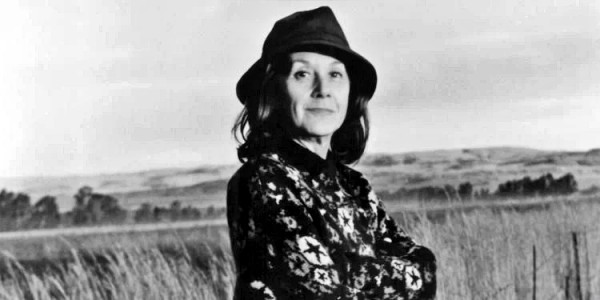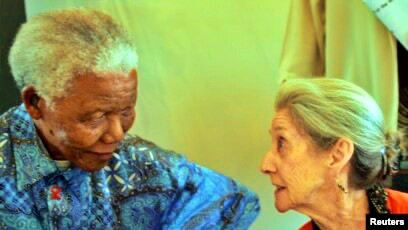Nadine Gordimer: The Life and Times
Brief Biography:
Nadine Gordimer was born on November 20, 1923, in Springs, a small mining town outside Johannesburg, South Africa. The daughter of Jewish immigrants—her father from Lithuania and her mother from London—Gordimer grew up in a segregated society, which deeply influenced her worldview. She began writing at an early age and published her first short story at 15. Gordimer attended the University of the Witwatersrand but did not complete her degree. Her literary career spanned over six decades, during which she became a prominent voice against apartheid in South Africa.
Cultural and Historical Context:
Gordimer’s work is inseparable from the turbulent socio-political landscape of 20th-century South Africa. Living through the rise and fall of apartheid, her writing reflects the injustices of a racially segregated society. She bore witness to the political struggles, violence, and systemic oppression faced by Black South Africans. Gordimer’s close relationships with prominent anti-apartheid figures, including Nelson Mandela, and her involvement in the African National Congress (ANC) contributed to her deep understanding of the socio-political realities of her time.
Significant Personal Experiences:
Gordimer’s upbringing in a white, privileged environment exposed her to the contradictions and moral complexities of apartheid. As she grew older, her interactions with the broader South African community and exposure to the brutalities of the regime ignited her activism. Several of her works were banned by the apartheid government, a testament to her commitment to challenging the status quo. Her personal experiences of witnessing racial injustice firsthand profoundly shaped her literary themes and political engagement.

Writing Style and Themes
Distinctive Elements of Her Writing Style:
Gordimer’s prose is characterized by its precision, depth, and moral intensity. She often employed a realist approach, focusing on the intricacies of human relationships and societal dynamics. Her narrative style combines psychological insight with a sharp socio-political critique. Unlike some of her contemporaries who might have used allegory or magical realism, Gordimer’s strength lay in her stark, unflinching realism.
Major Themes Explored:
- Apartheid and Racial Injustice: Many of her novels and short stories explore the moral and social complexities of life under apartheid, highlighting the struggles of marginalized communities.
- Identity and Alienation: She delves into the identity crises faced by individuals in a fractured society, particularly the moral dilemmas of white South Africans.
- Political Activism: Gordimer’s works often emphasize the importance of resistance and the ethical responsibilities of individuals living in unjust systems.
- Human Relationships: Beyond politics, she explored themes of love, betrayal, and the personal cost of political engagement.
Comparison with Contemporaries:
Gordimer’s work is often compared to that of J.M. Coetzee and Alan Paton, fellow South African writers who also grappled with themes of apartheid and moral responsibility. However, while Coetzee’s works are more allegorical and philosophical, Gordimer’s realist approach offers a direct, penetrating critique of society’s ills. Unlike Paton’s more hopeful tone, Gordimer’s writing often conveys a bleaker, more complex view of the human condition.
Successes and Recognitions
Notable Achievements:
Gordimer received numerous awards throughout her career, including the prestigious Nobel Prize in Literature in 1991, recognized for her “magnificent epic writing” and her uncompromising opposition to apartheid. She also won the Booker Prize for her novel The Conservationist (1974). Many of her works, such as Burger’s Daughter and July’s People, were banned in South Africa but gained international acclaim.
Impact on Literature:
Gordimer’s contributions to literature are profound. Her works are seminal texts in the canon of anti-apartheid literature and continue to be studied worldwide for their insight into racial and social dynamics. She played a crucial role in giving a voice to the voiceless, challenging global audiences to confront the realities of apartheid.
Influence on Other Writers and Movements:
Gordimer influenced a generation of South African writers, including Zakes Mda and Sindiwe Magona, encouraging them to address social and political issues through literature. Her work also inspired global movements for justice and equality, demonstrating the power of literature as a tool for social change.

Shortcomings and Criticisms
Controversies or Critiques Related to Her Work:
Nadine Gordimer faced criticism for the way she tackled complex racial and social issues in apartheid and post-apartheid South Africa. Some accused her of presenting a perspective that, while anti-apartheid, still reflected her privileged background. Critics argued that her depictions of Black South Africans sometimes fell into stereotypes or lacked the depth that her white characters received. Additionally, her involvement in the anti-apartheid struggle through literature was at times seen as controversial, with some questioning whether her works served more as commentary than direct activism.
Limitations in Storytelling or Thematic Approach:
Some critics pointed out that Gordimer’s dense prose and intricate narrative structures could be challenging for readers unfamiliar with South African history or politics. While her novels are celebrated for their intellectual rigor, they are sometimes described as emotionally distant or overly analytical. This complexity, while a strength for literary purists, limited her broader popular appeal.
Responses to Criticisms:
Gordimer often defended her approach by highlighting the importance of bearing witness to truth through literature. She maintained that her role as a writer was to present a realistic portrayal of society, no matter how uncomfortable. Rather than adapting to mainstream tastes or softening her themes, she remained steadfast in her commitment to addressing injustice, believing that the role of the writer was not to provide answers but to provoke thought and dialogue.
Political and Social Stance
Political Views and Reflection in Her Works:
Gordimer was an outspoken critic of apartheid and used her writing to expose the brutal realities of racial segregation and inequality. Her novels often examined the moral and ethical dilemmas faced by individuals under oppressive regimes. Through works like “Burger’s Daughter” and “July’s People,” she highlighted the complexities of resistance, complicity, and the personal cost of political activism. Her fiction did not merely serve as storytelling but as a form of political engagement, reflecting her belief in the writer’s responsibility to confront injustice.
Role as a Social or Political Activist:
Gordimer’s activism extended beyond her literary contributions. She was involved with the African National Congress (ANC) and supported anti-apartheid movements, even when such involvement was dangerous. She helped smuggle messages and manuscripts for the ANC and used her platform to amplify the voices of those oppressed by the regime. Post-apartheid, Gordimer continued to speak out on social issues, including corruption and the HIV/AIDS crisis in South Africa.
Impact of Political Ideology on Her Writing and Public Life:
Her political ideology was deeply embedded in her narratives, where personal stories intersected with broader social and political realities. Gordimer believed literature could change the world, and her works often served as a moral compass for readers navigating the complexities of South African society. Her commitment to justice and human dignity made her a respected public intellectual, and her influence extended beyond literature into the socio-political fabric of the nation.
Highlighted Works (Five Books by Nadine Gordimer)
1. July’s People (1981)
Brief Synopsis: Set in a near-future South Africa on the brink of civil war, this novel follows the Smales family, white liberals who seek refuge with their Black servant, July, in his rural village. The power dynamics shift as they navigate unfamiliar cultural terrain.
Key Themes: Race, power, privilege, and the collapse of social hierarchies.
Significance: This novel explores the fragility of liberal ideals when faced with real social upheaval, highlighting the complexities of race relations in a post-apartheid scenario.
2. Burger’s Daughter (1979)
Brief Synopsis: The story centers on Rosa Burger, the daughter of a white anti-apartheid activist who grapples with her father’s legacy after his death in prison. Rosa’s journey is one of self-discovery amidst political turmoil.
Key Themes: Political commitment, identity, legacy, and the cost of resistance.
Significance: This work examines the personal impact of political activism, particularly the burden of living up to revolutionary ideals in an oppressive society.
3. The Conservationist (1974)
Brief Synopsis: The novel follows Mehring, a wealthy white industrialist who owns a farm in South Africa. Despite his material success, Mehring’s life is hollow, and his relationship with the land and its people is strained.
Key Themes: Ownership, alienation, land, and existential emptiness.
Significance: Through Mehring’s story, Gordimer critiques the moral and emotional bankruptcy of apartheid-era white elites and their tenuous connection to the land they dominate.
4. My Son’s Story (1990)
Brief Synopsis: This novel tells the story of Sonny, a mixed-race schoolteacher turned activist, and his affair with a white social worker. Narrated by his son, Will, the novel explores the personal and political dimensions of betrayal.
Key Themes: Family, infidelity, political struggle, and generational conflict.
Significance: Gordimer delves into the intersection of personal betrayal and political commitment, examining the cost of both to individuals and their families during apartheid.
5. The Lying Days (1953)
Brief Synopsis: Gordimer’s first novel, it follows Helen Shaw, a young white woman growing up in a small mining town. As she matures, Helen becomes aware of the injustices around her and struggles to reconcile her privileged position with the reality of apartheid.
Key Themes: Coming of age, social awareness, privilege, and disillusionment.
Significance: This semi-autobiographical work introduces themes Gordimer would explore throughout her career, particularly the moral awakening of privileged white South Africans.

Conclusion: Legacy and Relevance of Nadine Gordimer
Nadine Gordimer’s works remain profoundly relevant today, largely due to their incisive exploration of apartheid and its enduring legacies. Her portrayal of South African society—particularly the moral and psychological impacts of racial segregation and inequality—offers timeless insights that resonate globally, especially in contemporary discussions on race, identity, and social justice. Gordimer’s works shed light on the complexities of privilege, activism, and the personal sacrifices required for societal change.
Her lasting impact on literature is immeasurable, not only in South Africa but worldwide. Gordimer was awarded the Nobel Prize in Literature in 1991, a recognition of her ability to weave political insight into compelling narratives. Her writing challenges readers to confront uncomfortable truths about societal norms and human relationships, urging critical reflection on how power dynamics shape our world. The social and political themes she addressed—particularly issues of racism, injustice, and the human capacity for change—remain pertinent as nations continue to grapple with similar challenges.
Gordimer’s impact extends beyond literature. Her works played a critical role in shaping the post-apartheid discourse, influencing a generation of writers and activists. They contributed to the global understanding of apartheid, its systemic cruelty, and its long-lasting effects on the people it oppressed.
For readers today, engaging with Gordimer’s works is a journey into the heart of South Africa’s struggle for equality and the human condition in times of intense political upheaval. Whether exploring the frailties of the human spirit in the face of injustice or the intricacies of human relationships under oppressive regimes, her writing offers profound lessons. Gordimer’s works continue to inspire readers to think critically about power, privilege, and the ways in which individuals can resist and change entrenched systems of inequality.
For those seeking to understand the intricacies of apartheid and its social impact, reading Gordimer is not only a rewarding literary experience but a call to be actively engaged in the world around us.















